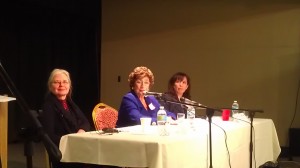Women Tell How They Helped Build Communities
by Matthew E. Semrau
March 18, 2013

TROY, Mich. — Mayor of Hamtramck, Dr. Karen Majewski, Honorary Consul of Chile, Mariela Griffor, and distinguished educator and researcher, Dr. Phyllis Noda, gathered at the Balkan American Center on Big Beaver Road to present a panel lecture entitled, “Women as Community Builders.”
The event was organized by the Niagara Foundation which — according to the event’s emcee — is a non-profit, non-political organization whose mission, is to encourage intercultural respect, appreciation, and tolerance. Two similar events were hosted last week in Lansing and Ann Arbor.
The panelist began by stressing that both genders should be concerned about the global issues facing women. Each women noted they were pleased to see a mixed audience of men and women. Keeping in line with the tenants of the Niagara Foundation, the event was not only about bringing awareness to the accomplishments and challenges of women, but encourage respect and tolerance between both sexes. “Focus on the test. It’s not a gender problem,” Noda explained, “It’s a matter of excellence.”
Noda explained how men can help empower women. “Don’t expect women to clean up after you,” she spoke generally. “Allow women to be involved in the creative and collaborative parts of projects. Don’t expect them to just do the paperwork. Give them the opportunity.”
Noda is currently a professor at Eastern Michigan University and a recognized expert in the field of education and development of educational programs. She has earned several awards and worked on many programs, including overseeing $40 million worth of programs for the U.S. Department of Education.
“You learn you can’t out shout men in a council meeting,” Majewski explained. “It’s better to fight with different tactics. I don’t have to shout, I hold the gavel.” But respect didn’t come automatically, “Stubbornness is important. You can’t be the women in the room who backs down.” Majewski is currently serving her second term as Mayor of Hamtramck.
“I see myself as an historian. If you had asked me at the beginning of my career I would have never imagined in my wildest dreams becoming what I am today,” Referring to her role as mayor. “You just don’t plan on being this. It just kind of happened.”
Griffor, a native of Chile, was forced into 12 years of exile in Sweden after politically opposing the military government of August Pinochet in Chile during the mid 80s. Her first husband, Julio Carlos Santibanez Romero, paid for his politics with his life.
In 1998, Griffor moved from Sweden to the United States with her second husband, an American. Speaking of positive influences in her life she reminisced, “He taught me there is something exciting, profound, beyond knowledge–the imagination.”
“When I think of challenge, I think it’s my middle name. I use to think that language and culture were the greatest challenges. But then I realized, the biggest challenge was inside of me. I believe sometimes we are our own enemy.” She stressed the need for “tolerance and courage” in the face of adversity.
For more information about the Michigan chapter of the Niagra Foundation visit www.niagarafoundation.org/michigan/.




One Comment
Comments are closed.